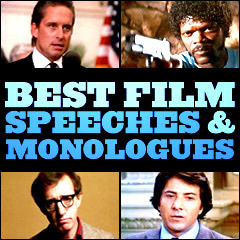|
Best Film Speeches and Monologues
|
|
Title Screen
|
Film Title/Year and Description of Film Speech/Monologue |
Screenshots
|
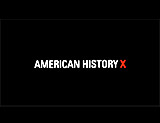
|
American History X (1998)
Screenwriter(s): David McKenna
 "We
Must Not Be Enemies" "We
Must Not Be Enemies"
Play clip (excerpt): 
Vengeful Neo-Nazi skinhead and violent ex-con
white supremacist Derek Vinyard (Edward Norton) cradled the
bloodied body of his dead brother Danny (Edward Furlong) in
his arms in a school bathroom, after he had been shot three
times in front of a bank of urinals by another black student.
A reformed Derek realized that he had been unable to prevent
his younger sibling from going down a similarly violent life
path ("Oh God, what did I do?").
Danny provided the
narration for the film's concluding voice-over, reading part
of the conclusion of his paper for his "American History
X" class, quoting in part from the conclusion of Abraham
Lincoln's First Inaugural Address, as images of a Venice
Beach sunset were shown:
So I guess this is where I tell you what
I learned - my conclusion, right? Well, my conclusion is:
Hate is baggage. Life's too short to be pissed off all
the time. It's just not worth it. Derek says it's always
good to end a paper with a quote. He says someone else
has already said it best. So if you can't top it, steal
from them and go out strong. So I picked a guy I thought
you'd like.
'We are not enemies, but friends. We must
not be enemies. Though passion may have strained, it must
not break our bonds of affection. The mystic chords of memory
will swell when again touched, as surely they will be, by
the better angels of our nature.'
|
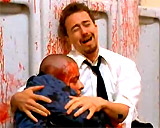

"We Must Not Be Enemies"

Venice Beach Sunset
|
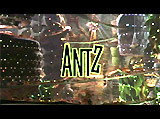
|
Antz (1998)
Screenwriter(s): Todd Alcott, Chris Weitz, Paul Weitz
 The
Insignificance of Being an Ant The
Insignificance of Being an Ant
Play clip (excerpt):  (short) (short)
The animated film's main character was neurotic
drone ant Z-4195 (or "Z"/Zee) (voice of Woody Allen),
living in a conformist, totalitarian ant society, without any
individuality. In his opening monologue, he complained about
his insignificant life during therapy to his psychologist (Paul
Mazursky), who concluded their discussion with the statement
that Zee had made a break-through: ("Yes, Z, you are insignificant"):
All my life, I've lived and worked in the
big city, which now that I think of it, is kind of a problem
since I always feel uncomfortable around crowds. I mean
it, I-I have this fear of enclosed spaces. I-I-I, everything
makes me feel trapped all the time. You know, I always
tell myself, there's gotta be something better out there,
but maybe I think too much.
I-I-I think everything must
go back to the fact that I had a very anxious childhood.
You know, my, my mother never had time for me. You know,
when you're - when you're the middle child in a family
of five million, you don't get any attention. I mean, how's
it possible?
And I've always had these, these abandonment
issues, which plagued me. My father was basically a drone
like I've said, and, you know, the guy flew away when I
was just a larva. And my job, don't get me started on,
'cause it really annoys me. I was not cut out to be a worker,
I'll tell you right now. I-I-I feel physically inadequate.
I, I, my whole life I've never, I've never been
able to lift more than ten times my own body weight, and,
and when you get down to it, handling dirt is, you know,
ewwww, is not my idea of a rewarding career. It's this
whole gung-ho super-organism thing that, that, that I -
you know, I can't get, I try but I can't get it. I mean
you know, what is it, I'm supposed to do everything for
the colony, and, and what about my needs? What about me?
I mean, I gotta believe there's someplace out there that's
better than this! Otherwise, I will just curl up in a larval
position and weep! The whole system makes me feel - insignificant!
|

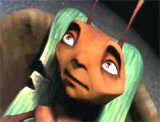
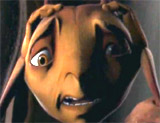
|

|
Antz (1998)
Screenwriter(s): Todd Alcott, Chris Weitz, Paul
Weitz
 "It's
Right Back Where I Started!" "It's
Right Back Where I Started!"
During the closing monologue (in voice-over),
Z (voice of Woody Allen) made an astonishing revelation after
finding romance with Princess Bala. The camera pulled
back to reveal the "world" where
Z lived - he was located in the Great Meadow in Central Park
(New York City):
There you have it. Your average 'boy-meets-girl,
boy-likes-girl, boy-changes-underlying-social-order' story.
So, what else can I tell you? We rebuilt the colony - it's
even better than before, you know, 'cause now it has a
very large indoor swimming pool. Bala and I, incidentally,
are thinking of starting a family. You know, just a few
kids, maybe a million or two to begin with. And I'm, I'm
workin' with a new therapist, you know, terrific, absolutely
terrific. He's, he's been putting me in touch with my inner
maggot, which is helping me a great deal. And, you know,
I finally feel like I found my place, and you know what?
It's right back where I started. But the difference is, this time
I chose it.
|
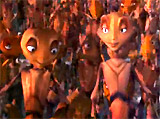
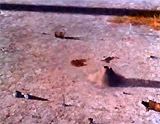
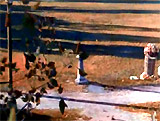

|

|
The Big Lebowski (1998)
Screenwriter(s): Ethan Coen, Joel Coen
 The
Introduction of the 'Dude' The
Introduction of the 'Dude'
Play clip (excerpt): 
The Stranger (Sam Elliott) delivered a voice-over
description of the bearded, long-haired Jeff "The Dude" Lebowski
(Jeff Bridges) in the film's opening lines, while a tumbleweed
rolled along in the middle of a street in late-night Los Angeles
to the ocean, along with the tune of Tumbling
Tumbleweeds, sung by Sons of the Pioneers.
The Dude was
first viewed with sunglasses and shuffling along in the flourescently-lit
dairy section of an almost-empty Ralph's Supermarket - opening
and smelling the contents of a quart container of Half-and-Half
(and drinking it off-screen, with the evidence showing
on his mustache), while wearing a long open gray overcoat, dirty
white T-shirt, his PJ bottoms, and slippers. At the checkout
counter, he wrote out an imprinted check (Jeffrey Lebowski
from Venice, CA) for $.69 cents - post-dated for September
11, 1991:
A way out west, there was this fella
that I wanna tell ya about. Fella by the name of Jeff Lebowski.
At least that was the handle his lovin' parents gave him,
but he never had much use for it himself. This Lebowski,
he called himself 'The Dude.' Now, 'Dude' - that's a name
no one would self-apply where I come from. But then there
was a lot about the 'Dude' that didn't make a whole lot
of sense to me. And a lot about where he lived, likewise.
But then again, maybe that's why I found the place so dern
interestin'.
They call Los Angeles the 'City Of Angels.' I didn't find it to be that, exactly.
But I'll allow there are some nice folks there. 'Course I can't say I seen London,
and I've never been to France. And I ain't never seen no queen in her damned
undies, as the fella says. But I'll tell ya what - after seein' Los Angeles,
and this a-here story I'm about to unfold, well, I guess I seen somethin' every
bit as stupefyin' as you'd see in any of those other places. And in English,
too. So I can die with a smile on my face, without feelin' like the good Lord
gypped me.
Now this a-here story I'm about to unfold took place back in the early '90s -
just about the time of our conflict with Sad'm and the I-raqis. I only mention
it because sometimes there's a man - I won't say a hero, 'cause, what's a hero?
But sometimes, there's a man - and I'm talkin' about the 'Dude' here. Sometimes,
there's a man, well, he's the man for his time and place. He fits right in there.
And that's the 'Dude' in Los Angeles. And even if he's a lazy man - and the 'Dude'
was most certainly that, quite possibly the laziest in Los Angeles County, which
would place him high in the runnin' for laziest worldwide. But sometimes there's
a man, sometimes, there's a man. Wow, lost my train of thought here. But, aw,
hell. I've done introduced him enough.
|

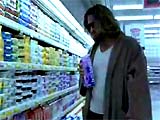
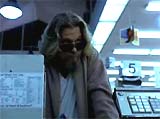
|

|
The Big Lebowski (1998)
Screenwriter(s): Ethan Coen, Joel Coen
 Eulogy
For a Fellow Bowler Eulogy
For a Fellow Bowler
As one of the "bereaved," Walter Sobchak
(John Goodman) presented a eulogy for fellow bowler Donny
(Steve Buscemi), before his ashes in a red Folger's coffee
can (a cheap substitute for the mortuary's "most modestly-priced
receptacle")
were scattered on the Pacific Ocean from a cliff promontory,
although the ashes blew back in their faces:
Donny was a good bowler, and a good man.
He was one of us. He was a man who loved the outdoors -
and bowling, and as a surfer, he explored the beaches of
Southern California, from La Jolla to Leo Carrillo and
up to Pismo. He died, he died as so many young men of his
generation before his time. In your wisdom, Lord, you took
him, as you took so many bright flowering young men at
Khe Sanh, at Langdok, at Hill 364. These young men gave
their lives. And so would Donny. Donny, who loved bowling.
And so, Theodore Donald Karabotsos, in accordance with
what we think your dying wishes might well have been, we
commit your final mortal remains to the bosom of the Pacific
Ocean, which you loved so well. Good night, sweet prince.
|
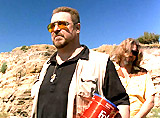
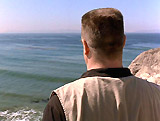


|
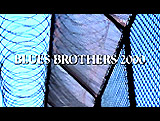
|
Blues Brothers 2000 (1998)
Screenwriter(s): Dan Aykroyd, John Landis
 The
Consequences of Turning Away From Jazz The
Consequences of Turning Away From Jazz
Rhythm and blues man Elwood Blues (Dan Aykroyd)
pleaded with his band members to not mutiny and desert him,
and the tradition of jazzy blues:
You may go if you wish. But remember this:
walk away now and you walk away from your crafts, your
skills, your vocations, leaving the next generation with
nothing but recycled, digitally-sampled techno-grooves,
quasi-synth rhythms, pseudo-songs of violence-laden gangsta-rap,
acid pop, and simpering, saccharine, soulless slush.
Depart now and you forever separate yourselves
from the vital American legacies of Robert Johnson, Muddy
Waters, Willie Dixon, Jimmy Reed, Memphis Slim, Blind Boy
Fuller, Louis Jordan, Little Walter, Big Walter, Sonny Boy
Williamson I and II, Otis Redding, Jackie Wilson, Elvis Presley,
Lieber and Stoller, and Robert K. Weiss...
Turn your backs now and you snuff out the fragile
candles of blues, R&B and soul, and when those flames
flicker and expire, the light of the world is extinguished
because the music which has moved mankind from seven decades
leading to the millennium will wither and die on the vine
of abandonment and neglect.
|
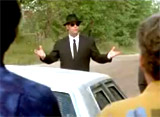
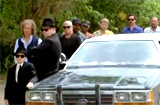
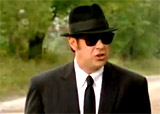
|
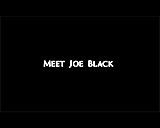
|
Meet Joe Black (1998)
Screenwriter(s): Ron Osborn, Jeff Reno, Kevin Wade, Bo Goldman
 Advice
From Father to Daughter on How to Find Real Love - "Listen
to Your Heart" Advice
From Father to Daughter on How to Find Real Love - "Listen
to Your Heart"
On a corporate helicopter with his daughter Susan
(Claire Forlani), head of Parrish Communications William Parrish
(Anthony Hopkins) asked whether she loved and was going to
marry Drew (Jake Weber), and then cautioned her:
"It's not what you say about Drew. It's what you don't say."
He then offered his advice about true love from the heart:
Listen, I'm crazy about the guy. He's smart,
he's aggressive. He could carry Parrish Communications
into the 21st century and me along with it....That's for
me. I'm talking about you. It's not what you say about
Drew. It's what you don't say...There's not an ounce of
excitement, not a whisper of a thrill. And this relationship
has all the passion of a pair of tit-mice. I want you to
get swept away out there. I want you to levitate. I want
you to sing with rapture and dance like a dervish...Yeah.
Be deliriously happy, or at least leave yourself open to
be...
I know it's a cornball thing, but love is
passion, obsession, someone you can't live without. I say,
fall head over heels. Find someone you can love like crazy
and who will love you the same way back. How do you find
him? Well, you forget your head, and you listen to your heart.
And I'm not hearing any heart. Cause the truth is, honey,
there's no sense living your life without this. To make the
journey and not fall deeply in love, well, you haven't lived
a life at all. But you have to try, 'cause if you haven't
tried, you haven't lived.
She said "Bravo," and then asked him
to give it to her again, only this time with the short version.
He replied:
Okay. Stay open. Who knows? Lightning could
strike. (He grimaced his face) Yeah.
|
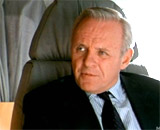
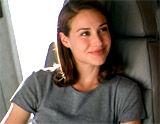
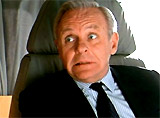
|

|
Meet Joe Black (1998)
Screenwriter(s): Ron Osborn, Jeff Reno, Kevin Wade,
Bo Goldman
 65th
Birthday Party Speech ("65 Years, Don't They Go By In
A Blink") 65th
Birthday Party Speech ("65 Years, Don't They Go By In
A Blink")
Play clip (excerpt): 
Wealthy and powerful William Parrish (Anthony
Hopkins) spoke at his 65th birthday party (on the verge of
his own death), breaking precedent by telling the crowd his
one-candle wish, before being escorted into the afterlife:
I thought I was gonna sneak away tonight.
What a glorious night. Every face I see is a memory. It
may not be a perfectly perfect memory. Uh, sometimes we
had our ups and downs. But we're all together and you're
mine for a night. And I'm gonna break precedent and tell
you my one-candle wish - that you would have a life as
lucky as mine, where you can wake up one morning and say,
'I don't want anything more.' (Long pause)
Sixty-five years. Don't they go by in a blink.
|

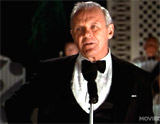
|
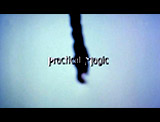
|
Practical Magic (1998)
Screenwriter(s): Robin Swicord, Akiva Goldsman, Adam Brooks
 The
Family's Curse and A Plea to Find True Love - "I Just
Want Someone To Love Me" The
Family's Curse and A Plea to Find True Love - "I Just
Want Someone To Love Me"
Widowed and lonely witch Sally Owens (Sandra
Bullock), in voice-over, wrote a letter to her sister Gillian "Gilly" (Nicole
Kidman), both orphaned nieces. She described her "emptiness"
due to the fact that they were both doomed as witches. They were
cursed that the men they fell in love with were ultimately doomed
to an untimely and tragic death, and she was preventing herself
from falling in love:
Dearest Gilly: Sometimes I feel there is
a hole inside of me - an emptiness that at times seems
to burn. I think if you lifted my heart to your ear, you
could probably hear the ocean. And the moon tonight, there's
a circle around it, a sign of trouble not far behind. I
have this dream of being whole, of not going to sleep each
night wanting. But still sometimes, when the wind is warm
or the crickets sing, I dream of a love that even time
will lie down and be still for.
I just want someone to love me. I want to
be seen. (She sealed the envelope with melted wax)
I don't know. Maybe I've had my happiness. (She walked
the letter out to the postbox for pickup) I don't want
to believe it, but there is no man, Gilly. Only that moon
(She looked up at the moon).
|

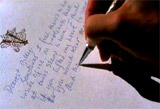
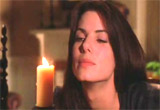
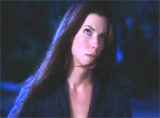
|

|
Rounders (1998)
Screenwriter(s): David Levien, Brian Koppelman
 "If
You're Too Careful, Your Whole Life Can Become a F--kin'
Grind" "If
You're Too Careful, Your Whole Life Can Become a F--kin'
Grind"
Play clip (excerpt): 
High stakes poker gambler (and law school student)
Mike McDermott (Matt Damon), in the first lines of the film
under the credits, spoke in voice-over. He was gathering together
hidden wads of money in his apartment, just before taking an
elevator down to an underground illegal poker room in NYC.
There, he lost his entire bankroll playing poker (in a game
of Texas Hold 'Em) against Russian mobster Teddy
"KGB" (John Malkovich):
Listen, here's the thing. If you can't spot
the sucker in your first half hour at the table, then you are the
sucker. Guys around here will tell ya, you play for a living,
it's like any other job. You don't gamble, you grind it
out. Your goal is to win one big bet an hour, that's it.
Get your money in when you have the best of it. Protect
it when you don't. Don't give anything away. That's how
I paid my way through half of law school. A true grinder.
You see, I learned how to win a little at a time. But finally
I've learned this: if you're too careful, your whole life
can become a f--kin' grind. This is Teddy KGB's place.
You won't find it in the Yellow Pages.
Later in the film, he was reluctantly forced
to return to card gambling in order to save his childhood friend
Lester 'Worm' Murphy (Edward Norton) from loan sharks. |

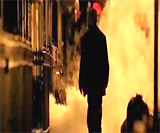
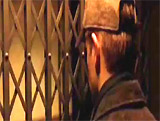
|
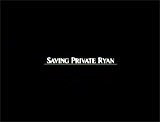
|
Saving Private Ryan
(1998)
Screenwriter(s): Robert Rodat
 To
Defuse a Tense Situation, Miller's Address to His Unit on
'Saving' Private Ryan: "Man Means Nothin' to Me" To
Defuse a Tense Situation, Miller's Address to His Unit on
'Saving' Private Ryan: "Man Means Nothin' to Me"

Play clip (excerpt): 
During his search for Private Ryan (Matt Damon),
Ranger Captain Miller (Tom Hanks) spoke to his unit about his
pre-war occupation (a question that had prompted a betting
pool about his pre-war occupation) as an English teacher, and
his goal of finding Ryan in the fictional town of Ramelle.
He had to defuse a tense situation by confronting the threat
of desertion by squad member Private Richard Reiben (Edward
Burns):
Mike? What's the pool on me up to right now?
What's it up to? What is it, uh, $300 dollars -- is that
it? Three hundred? I'm a school teacher. I teach English
Composition in this little town called Adley, Pennsylvania.
The last eleven years, I've been at Thomas Alva Edison
High School. I was the coach of the baseball team in the
spring time. Back home when I tell people what I do for
a living, they think, well, that, that figures. But over
here, it's a big, a big mystery. So I guess I've changed
some. Sometimes I wonder if I've changed so much my wife
is even gonna recognize me whenever it is I get back to
her, and how I'll ever be able to, to tell her about days
like today. Ah, Ryan - I don't know anything about Ryan.
I don't care. Man means nothin' to me. It's just a name.
But if, (sigh) you know, if goin' to Ramelle and
findin' him so he can go home, if that earns me the right
to get back to my wife, well, then, then that's my mission.
To Private Reiben:
You wanna leave? You wanna go off and fight
the war? Alright. Alright, I won't stop ya. I'll even put
in the paperwork. I just know that every man I kill, the
farther away from home I feel.
|
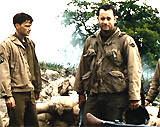
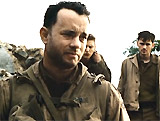
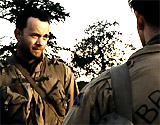
|
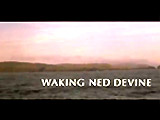
|
Waking Ned Devine (1998,
UK/Ire.)
Screenwriter(s): Kirk Jones
 A
Memorial Funeral Service for a Live Person A
Memorial Funeral Service for a Live Person
The memorial funeral service delivered by small-town
Tullymore resident Jackie O'Shea (Ian Bannen) was not for
the deceased individual - Irish National Lottery winner Ned
Devine (Jimmy Keogh) - but for his old friend Michael O'Sullivan
(David Kelly) who was alive and in the front row. He was impersonating
the dead man for lottery official Jim Kelly (Brendan Dempsey)
who happened to be in attendance, so that the 52 relieved townspeople
could split the winnings (130,000 pounds each):
As we look back on the life of... (pause)
Michael O'Sullivan was my great friend, but I don't ever
remember telling him that. The words that are spoken at
a funeral are spoken too late for the man who is dead.
What a wonderful thing it would be to visit your own funeral.
To sit at the front and hear what was said. Maybe to say
a few things yourself. Michael and I grew old together.
But at times, when we laughed, we grew younger. If he was
here now, if he could hear what I say, I'd congratulate
him on being a great man, and thank him for being a friend.
|

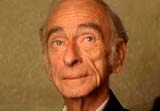
|
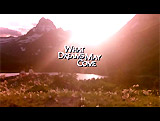
|
What Dreams May Come (1998)
Screenwriter(s): Ron Bass
 Eulogy for a Dead Son Eulogy for a Dead Son
Pediatrician Dr. Chris Nielsen
(Robin Williams) and his beautiful wife Annie (Annabella Sciorra)
lost their two children Marie (Jessica
Brooks Grant) and Ian (Josh Paddock) in an off-screen car crash
after he waved goodbye. Four years later, Chris also suffered
a tragic death and went to a heavenly afterlife. When his despondent
wife Annie committed suicide and went to Hell, he hired a Tracker
(Max von Sydow) to bring her back. During his journey, he experienced
a flashback to his son Ian's funeral and his own eulogy delivered for him:
There's a man Ian never got to know - the man
he was growing up to be. He's a good-looking, clear-eyed young
fella, about 25. I can see him. He's the type of guy that men
want to be around, because he has integrity, you know? He
has character. You can't fake that. He's a guy women want
to be around, too, because there's tenderness in him, respect,
loyalty, and courage. And women respond to that. Makes him
a terrific husband, this guy. I see him as a father. That's
where he really shines. See, when he looks in his kid's eyes
and that kid knows that his dad really sees him,
he sees who he is. Then that child knows that he is an amazing
person. He's quite a guy that I'll never get to meet. I
wish I had.
|
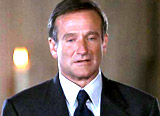
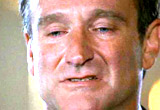
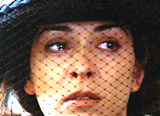
|

|
What Dreams May Come (1998)
Screenwriter(s): Ron Bass
 Sentimental
Apology to Wife in Hell After Her Suicidal Death Sentimental
Apology to Wife in Hell After Her Suicidal Death
Later, when he saw his suicidal wife Annie (Annabella
Sciorra) in Hell and was trying to bring her back, husband Chris
Nielsen (Robin Williams) apologized to her for all the things
he could never give her anymore:
I'm sorry, babe, but there's some things
I have to say. I've only got a few moments left. I'm sorry
for all the things I'll never give you. I'll never buy you
another meatball sub with extra sauce -- that was a big one!
I'll never make you smile. I just wanted us to be old together,
just two old farts laughin' at each other as our bodies fell
apart, together at the end by that lake in your painting. That
was our Heaven, see? There's lots of things to miss: books,
naps, kisses, and fights! God, we had some great ones. Thank
you for those. Thank you for every kindness. Thank you for
our children. For the first time I saw them. Thank you for
being someone I was always proud to be with. For your guts.
For your sweetness. For how you always looked, for how I always
wanted to touch you. You were my life. I apologize for every
time I failed you. Especially this one.
|
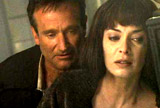
|
